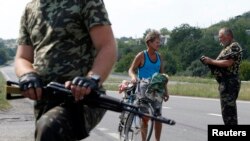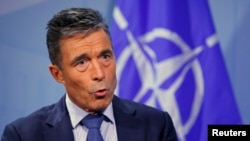Russian President Vladimir Putin on Monday told European Commission President Jose Manuel Barroso that Russia was coordinating with the International Committee of the Red Cross to send humanitarian aid to Ukraine.
“The Russian side, in collaboration with representatives of the International Committee of the Red Cross (ICRC), is sending a humanitarian convoy to Ukraine,'' the Kremlin said in a read-out of a telephone call between the two leaders.
The European Commission confirmed that the phone call took place but said that Barroso warned Putin against any military action in Ukraine.
“President Barroso warned against any unilateral military actions in Ukraine, under any pretext, including humanitarian,'' the commission said in a statement.
U.S. President Barack Obama, in phone call Monday, told Ukrainian President Petro Poroshenko that any Russian intervention in Ukraine "without the formal, express consent and authorization of the Ukraine government would be unacceptable and a violation of international law," the White House said in a read-out of the call.
Ukraine, which has previously warned Russia against any unilateral initiatives, says it would support a ICRC-led mission with the participation of the EU, Russia, Germany and other partners, according to a read-out of the Obama-Poroshenko phone call as published on the Ukrainian leader’s website. Obama confirmed that “the U.S. intends to play an active part in such an international humanitarian mission,” the statement said.
French news agency AFP quoted Putin's spokesman Dmitry Peskov as saying that the convoy Russia plans to send to Ukraine will not have a "military escort." He said that the mission had been "agreed with" Kyiv and will be supervised by the International Committee of the Red Cross.
The ICRC, in a statement Monday, said no agreement on Russian participation is in place and said "practical details need to be clarified" before such a mission can move forward.
NATO chief warns of 'high probability' of incursion
Meanwhile, NATO's secretary general says the alliance has seen no sign of Russian forces pulling back from the border with Ukraine and that there is "a high probability" Moscow will intervene militarily in the eastern part of the country.
"We see the Russians developing the narrative and the pretext for such an operation under the guise of a humanitarian operation and we see a military buildup that could be used to conduct such illegal military operations in Ukraine," Anders Fogh Rasmussen told the Reuters news agency earlier Monday.
“Any Russian intervention under the guise of a humanitarian mission would be unjustified and illegal,” Rasmussen said.
Putin's spokesman Dmitry Peskov, meanwhile, said Monday that Russia will send humanitarian aid into eastern Ukraine, "if we can agree all details with all the partners." He said that if such an agreement is reached, the aid would be sent "immediately" because of the "tragic humanitarian situation" in the region.
Thousands of people in Ukraine's Russian-speaking east are reported short of water, medical aid and electricity, as Ukraine forces battle pro-Russian separatists trying to establish an autonomous region near the Russian border.
On Saturday, Ukraine claimed it had thwarted an attempt by Russia to send troops into Ukraine under a supposed agreement with the Red Cross and the guise of peacekeepers, with the aim of provoking a large-scale military conflict. Moscow dismissed the allegation as a "fairy tale."
Last week, NATO said Russia had amassed around 20,000 combat-ready troops on Ukraine's eastern border.
NATO intervention?
Asked if NATO would intervene militarily in Ukraine if Russian forces did invade, Rasmussen all but ruled out direct involvement but said there would be consequences for Moscow.
“We are not considering military operations. If the Russians were to intervene further in Ukraine, I have no doubt that the international community would respond determinedly, notably through broader, deeper, tougher economic sanctions that would isolate Russia further,” he said.
Rasmussen accused Russia of creating the “disastrous humanitarian situation” in eastern Ukraine, and suggested that the best way for Moscow to end the crisis would be to “stop the flow of weapons and fighters and money into Ukraine and cease the support for armed separatists and engage in a constructive political dialogue.”
Russia has repeatedly denied direct involvement in the conflict in Ukraine.






